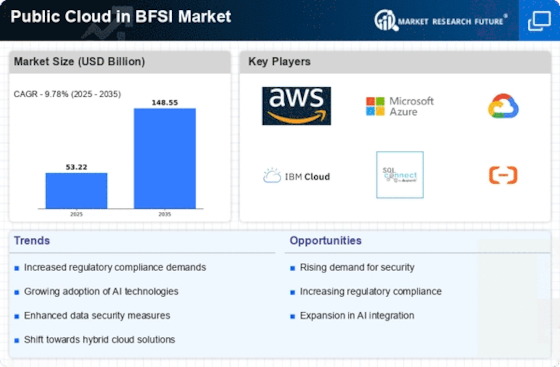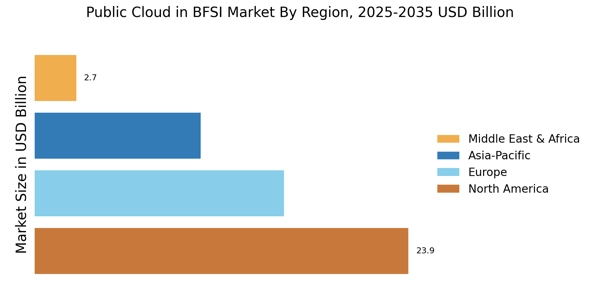Scalability and Flexibility
Scalability and flexibility are fundamental attributes driving the adoption of the Public Cloud in BFSI Market. Financial institutions often face fluctuating demands, particularly during peak transaction periods. Public cloud solutions provide the necessary infrastructure to scale resources up or down seamlessly, ensuring that institutions can meet customer demands without incurring excessive costs. This flexibility is particularly advantageous for banks and financial service providers looking to innovate and expand their service offerings. Data indicates that organizations leveraging cloud scalability can reduce time-to-market for new products by as much as 40%. As the financial landscape continues to evolve, the ability to adapt quickly to changing market conditions through scalable cloud solutions is likely to be a key competitive advantage.
Enhanced Collaboration and Innovation
Enhanced collaboration and innovation are increasingly recognized as vital drivers within the Public Cloud in BFSI Market. The cloud facilitates seamless communication and collaboration among teams, regardless of geographical location. This capability is particularly beneficial for multinational financial institutions that require cohesive operations across various regions. Furthermore, the public cloud fosters an environment conducive to innovation, allowing organizations to experiment with new technologies and services without significant upfront investments. Recent findings suggest that companies embracing cloud collaboration tools have seen a 20% increase in project efficiency. As the BFSI sector continues to prioritize innovation to meet evolving customer expectations, the role of public cloud solutions in enhancing collaborative efforts is likely to become more pronounced.
Cost Efficiency and Operational Agility
Cost efficiency remains a pivotal driver in the Public Cloud in BFSI Market. Financial institutions are increasingly seeking ways to optimize their operational expenditures while maintaining high service levels. Public cloud solutions offer a pay-as-you-go model, which allows organizations to scale resources according to demand, thus reducing unnecessary capital expenditures. Recent studies indicate that banks utilizing public cloud services have reported up to 30% reductions in IT costs. Furthermore, the agility provided by cloud infrastructure enables rapid deployment of new services and products, which is essential in a competitive market. This operational flexibility not only enhances customer satisfaction but also positions institutions to respond swiftly to market changes, thereby reinforcing their competitive edge.
Data Analytics and Business Intelligence
The integration of advanced data analytics and business intelligence tools within the Public Cloud in BFSI Market is transforming how financial institutions operate. By leveraging cloud-based analytics, organizations can gain deeper insights into customer behavior, market trends, and operational efficiencies. This capability is particularly crucial as the BFSI sector generates vast amounts of data daily. Reports suggest that institutions utilizing cloud analytics experience a 25% increase in decision-making speed. The ability to analyze data in real-time allows for more informed strategic decisions, enhancing customer engagement and retention. As competition intensifies, the reliance on data-driven insights through public cloud solutions is likely to become a cornerstone of successful business strategies in the BFSI sector.
Regulatory Compliance and Risk Management
The Public Cloud in BFSI Market is increasingly influenced by the need for stringent regulatory compliance and effective risk management. Financial institutions are mandated to adhere to various regulations, such as GDPR and PCI DSS, which necessitate robust data protection measures. The adoption of public cloud solutions enables these institutions to implement advanced security protocols and compliance frameworks more efficiently. According to recent data, approximately 70% of financial organizations are prioritizing compliance as a key driver for cloud adoption. This trend suggests that the public cloud can facilitate real-time monitoring and reporting, thereby enhancing risk management capabilities. As regulatory landscapes evolve, the ability to swiftly adapt to new compliance requirements through cloud solutions may become a critical differentiator in the BFSI sector.


















